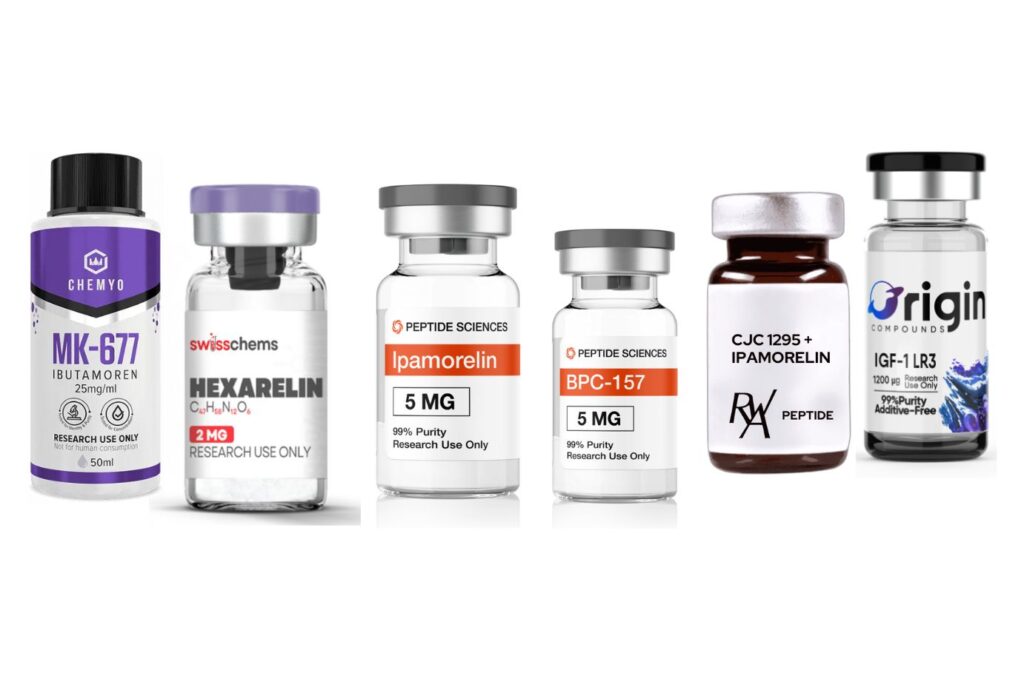Table of Content
- What are Peptides?
- What Are Peptides Used For?
- Are peptides safe?
- 6 Best Peptides for Muscle Growth
- Ipamorelin
- CJC-1295
- BPC-157
- IGF-1 LR3
- Hexarelin
- MK-677 (Ibutamoren)
Building muscle faster and achieving peak physique are top goals for many. Peptides for muscle growth are gaining popularity, so in this article we’ll explore a list of 6 Peptides for Muscle Growth, including their dosage and benefits. But before we delve into these potentially powerful tools, it’s crucial to understand
What are Peptides?
Peptides, short chains of amino acids, act as messengers within the body, influencing various functions. They are naturally occurring molecules that can have various effects, including promoting muscle growth. Peptides for muscle growth work by stimulating protein synthesis, enhancing recovery, and supporting muscle hypertrophy. These peptides can aid in optimizing muscle development and performance in a natural and effective way.
What Are Peptides Used For?
Peptides are used for various purposes, including muscle growth, recovery, and overall health. Here are the top 5 uses of peptides for muscle growth:
- Muscle Growth: Peptides are used to stimulate muscle growth by increasing protein synthesis, enhancing collagen production, and promoting muscle hypertrophy.
- Muscle Recovery: Peptides can aid in muscle recovery by enhancing the body’s natural ability to repair and rebuild muscle tissue.
- Fat Loss: Certain peptides have been shown to assist in fat loss by increasing fat metabolism and enhancing the body’s ability to burn fat.
- Performance Enhancement: Peptides can be used to enhance workout performance by increasing endurance, reducing fatigue, and improving overall physical function.
- Anti-Aging and Anti-Inflammatory Effects: Some peptides have been found to have anti-aging and anti-inflammatory properties, which can contribute to overall health and well-being.
These uses of peptides are backed by scientific research and are popular among athletes and bodybuilders seeking to optimize their performance and physique.
Are peptides safe?
Peptide therapy is typically safe when guided by a healthcare professional. While most individuals experience few side effects from peptide supplements, it’s important to note that these supplements are not evaluated by the FDA before being marketed. Thus, exercising caution when purchasing and using them is crucial.
Specifically, the following individuals should not use peptide supplements:
- Pregnant or Nursing Women
- Pre-Existing Medical Conditions
- Individuals Taking Medications
- Compromised Immune Systems
- Individuals with Allergies or Sensitivities
5 Potential Side Effects of Peptides
- Allergic Reactions
- Cardiovascular Issues
- Gastrointestinal Problems
- Skin Sensitivity
- Cognitive Impairment
It’s important to note that the severity and likelihood of these side effects can vary depending on the specific peptide, the dosage, and the individual’s sensitivity. Consulting a healthcare professional before using peptide supplements is highly recommended.
Also Read | How to Speed Up Muscle Strain Recovery?
6 Best Peptides for Muscle Growth
Ipamorelin
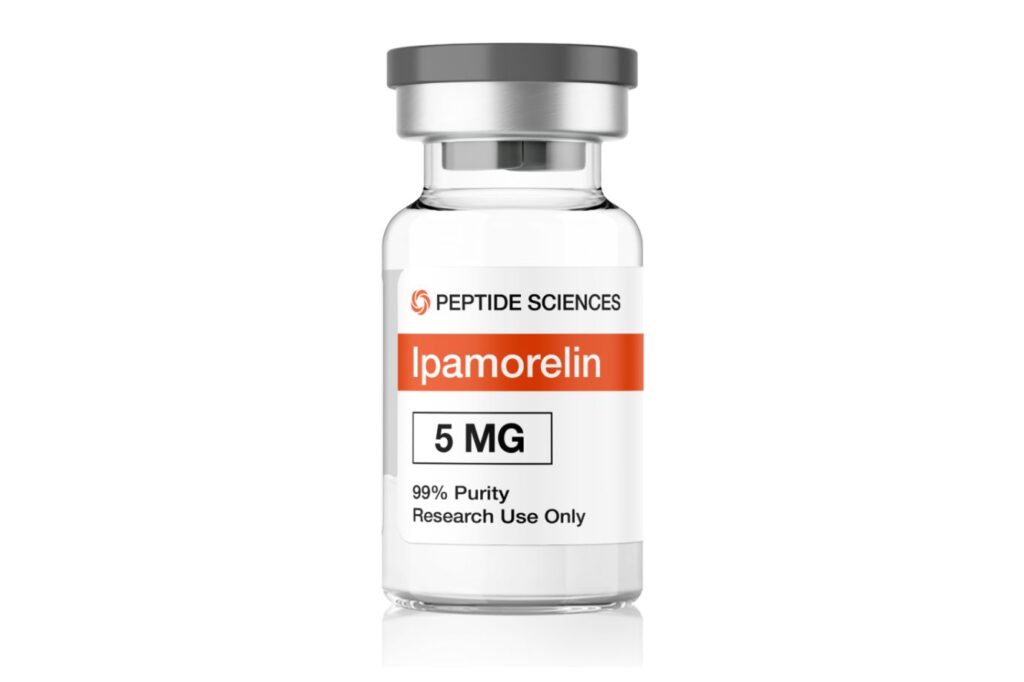
Ipamorelin is a synthetic peptide that mimics the action of the body’s natural growth hormone-releasing hormone (GHRH). It is well-tolerated and has fewer side effects compared to some other GHRPs.
What is It Good for?
- Increased lean muscle mass due to the growth of new muscle cells
- Improved workouts and recovery
- Reduced body fat
- Increased energy, strength, and stamina
- Deeper, more restful sleep
Dosage: Typical dosage ranges from 100-300 mcg, administered subcutaneously or intranasally.
CJC-1295
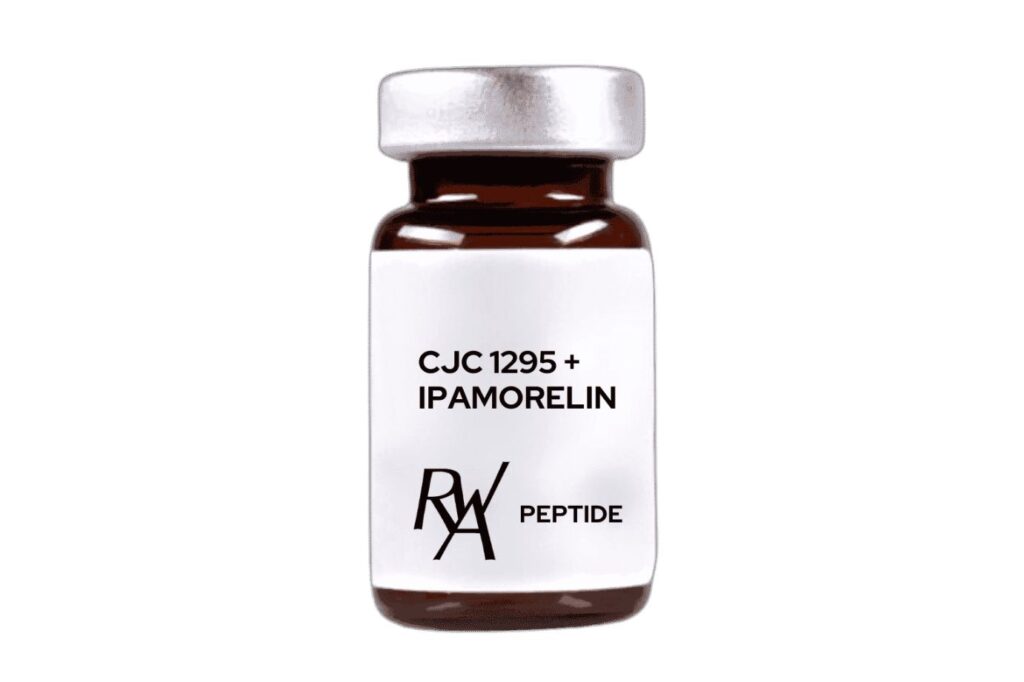
CJC-1295 is a synthetic peptide that mimics the action of the body’s natural GHRH. It has a longer half-life than many other GHRPs, allowing for less frequent dosing.
What is It Good for?
- Increased Muscle Mass
- Improved Recovery and Repair from Injuries
- Improve Cognitive Function and Mental Clarity
- Improve in sleep quality.
- Increased Metabolic Rate and Energy
Dosage: Typical dosage ranges from 100-300 mcg, administered subcutaneously or intramuscularly.
BPC-157
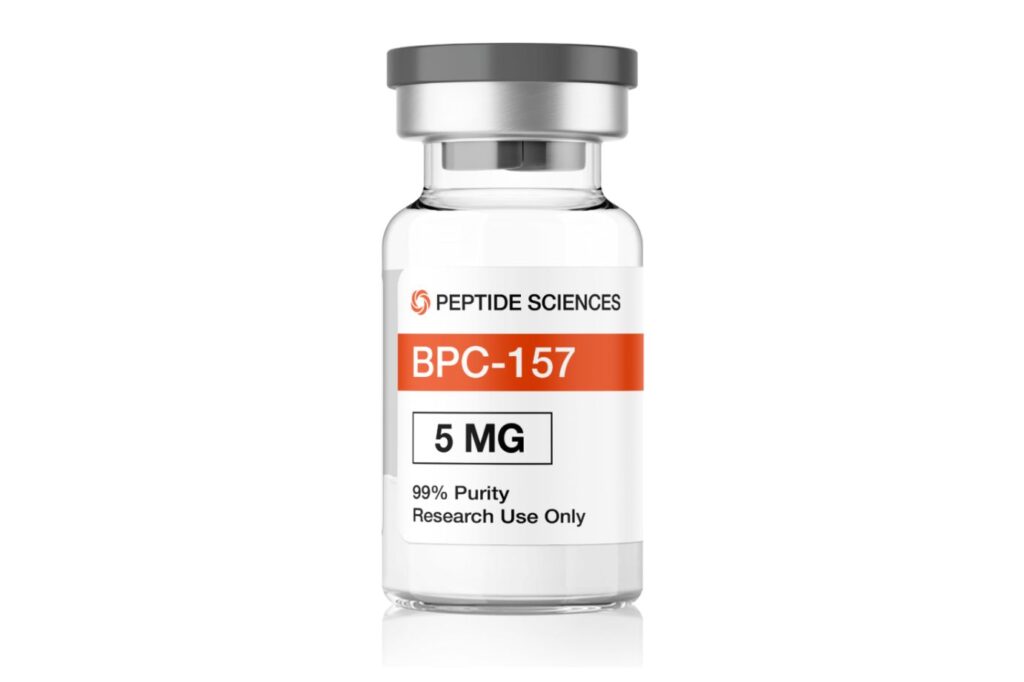
BPC-157 is a synthetic peptide derived from a naturally occurring gastric peptide. It has demonstrated remarkable healing properties and may have potential applications in muscle growth and recovery.
What is It Good for?
- Increases blood flow to promote rapid healing in areas like skin, bone, ligaments, and tendons.
- Lowered Blood Pressure
- Promotes cellular regeneration, aiding in tissue repair and overall health.
- Muscle growth and Development
- Improve brain function and cognition.
- Boost serotonin production, which can help improve mood.
Dosage: Typical dosage ranges from 200-800 mcg, administered orally, subcutaneously, or intramuscularly.
Also Read | Best Ashwagandha Brand
IGF-1 LR3
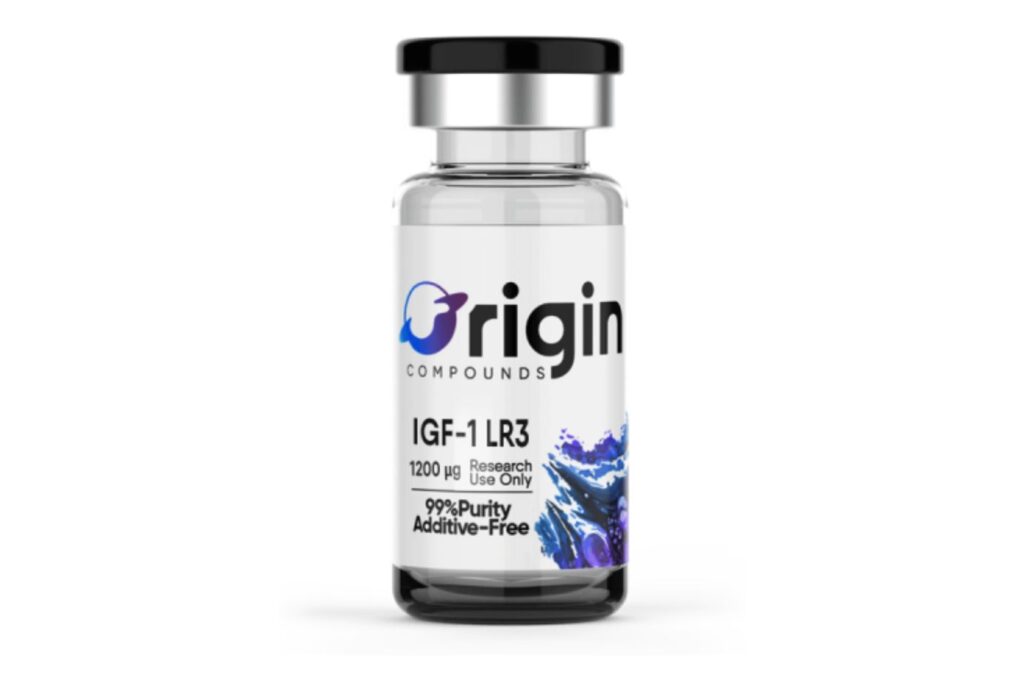
IGF-1 LR3 is a synthetic peptide that mimics the action of the body’s natural IGF-1. It has a longer half-life than regular IGF-1, allowing for less frequent dosing.
What is It Good for?
- Increasing Muscle Mass
- Enhancing Strength
- Improving Muscle Recovery Time
- Promoting Weight Loss
- Cell growth, survival, and protection against cellular damage
Dosage: Typical dosage ranges from 20-100 mcg, administered subcutaneously or intramuscularly.
Hexarelin
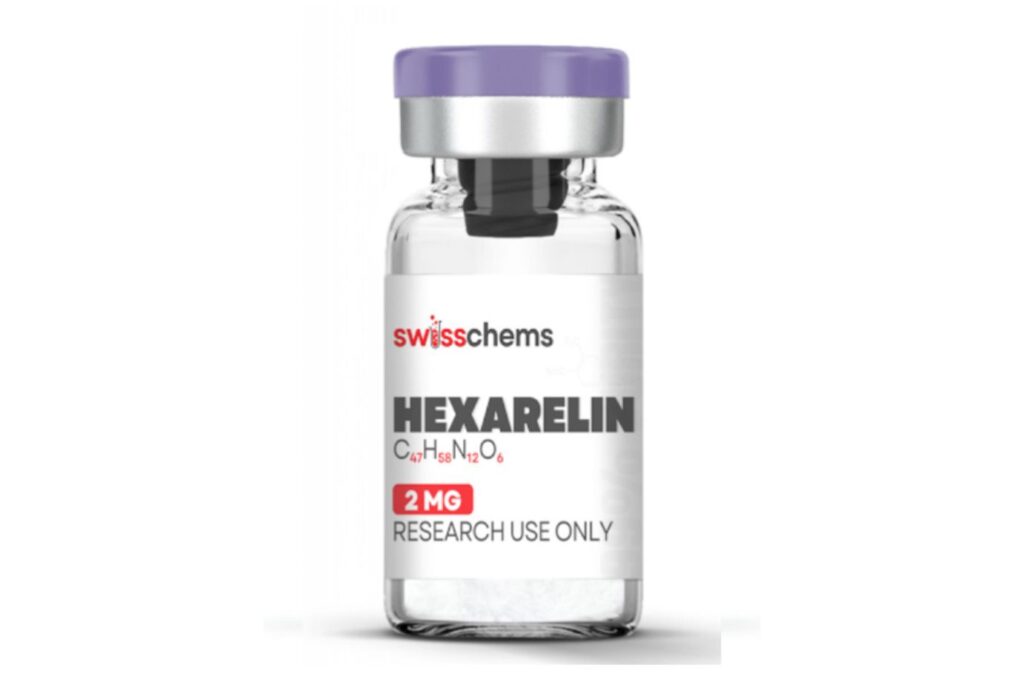
Hexarelin is a synthetic peptide that mimics the action of the body’s natural growth hormone-releasing hormone (GHRH). It is known for its potent GH-releasing effects and may have additional benefits for sleep and recovery.
What is It Good for?
- Promote muscle growth by stimulating the release of growth hormone, which plays a crucial role in muscle development and repair.
- Strength Improvement
- Boost growth hormone secretion can aid in faster recovery from intense workouts or injuries
- Promoting fat loss by increasing metabolic rate and enhancing lipid metabolism.
- Improved skin quality, enhanced bone density, and overall vitality.
Dosage: Typical dosage ranges from 100-300 mcg, administered subcutaneously or intranasally.
MK-677 (Ibutamoren)
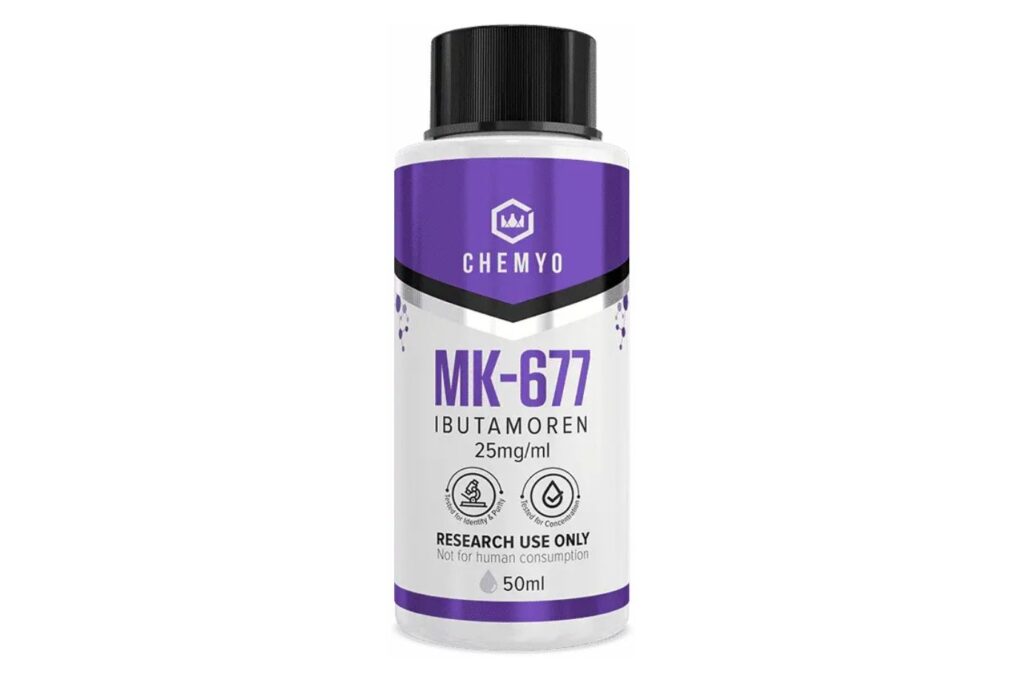
MK-677 (Ibutamoren) is a non-peptide agonist of the ghrelin receptor, which means it mimics the actions of the hormone ghrelin to stimulate GH release. It is taken orally and has a long half-life, allowing for once-daily dosing.
What is It Good for?
- Muscle Building and maintaining lean body mass
- Can help alleviate muscle wasting caused by protein deficiency
- Increased Bone Density
- Improved Sleep Quality
- Boosts growth hormone and IGF-1 levels in aging individuals, improving hormone balance.
Dosage: Typical dosage ranges from 10-25 mg, taken orally once per day.
Also Read | Best Multivitamins for Men
Conclusion
In pursuit of boosting muscle growth, many have turned to peptides for muscle growth. However, it’s crucial to approach these compounds cautiously. Peptides for muscle growth are not thoroughly regulated, and their long-term safety is not fully understood.
Consult a healthcare professional before using any peptides for muscle growth purposes. These are potent substances that can interact with biological systems and potentially cause adverse effects, especially with improper use or lack of medical supervision.
Prioritize overall health above rapid muscle gains. While peptides for muscle growth may offer potential benefits, they should be considered cautiously and under proper guidance. Responsible fitness approaches combined with balanced nutrition and consistent exercise remain the safest paths to achieving your goals sustainably.
Disclaimer: The legal status of peptides for muscle growth can vary depending on your location. In many countries, they are classified as unregulated supplements, while others may have stricter regulations or outright bans. It is your responsibility to check the legal status of peptides in your area before considering their use.

